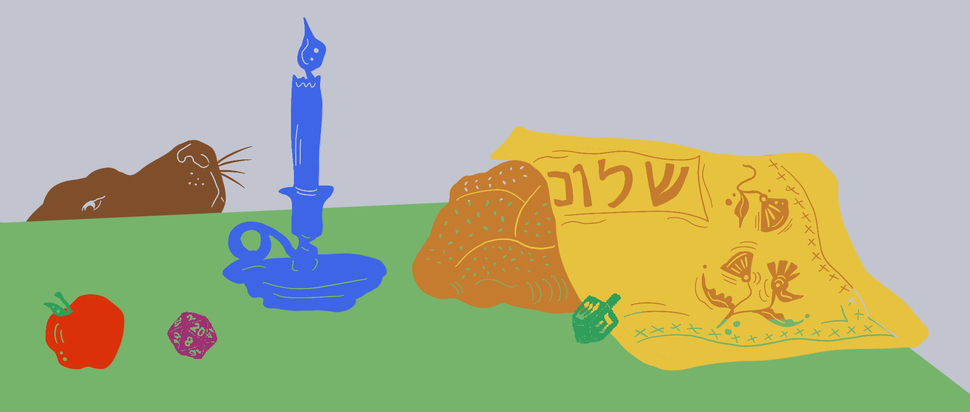A Latke in Common: Continuing & adapting Jewish traditions
There's joy in tradition – whether old, new, or something in-between. One writer reflects on connecting with the Jewish faith and community through both the conventional and unconventional
Over lockdown, my Dad got very into DNA kits. He swabbed nearly every family member this side of the Atlantic, and, in doing so, discovered several more. He managed to connect our family (albeit through marriage) to Peter Sellers and Daniel Mendoza, the 18th-century Jewish boxer. Irritatingly, he also discovered that we are distantly related to several people I went to school with, who are now permanent features on our family tree.
He is understandably proud of our Jewish heritage; consistent efforts have been made throughout history to ensure our family did not make it to the 21st century. For him, our existence is a triumph laughing in the face of centuries of antisemitism.
In 1940, my grandfather buried the dog tags marking him as Jewish in the sands of Calais. Later, when Germans captured his unit, they asked all Jewish soldiers to step forward. Had it not been for two men who restrained him, he would have. Later still, filling out his papers, he listed his mother’s maiden name as ‘Cone’ rather than the identifiably Jewish ‘Cohen’, and checked himself into the Lamsdorf prisoner of war camp as ‘Protestant’.
These methods of survival and identity are core components of our family history – so it is with most Jewish families. Our family emigrated from Tsarist Russia, arriving in Leith and settling in Edinburgh before migrating to London. Coming to Edinburgh to study, and later live, and hearing, "you’re the first Jewish person I’ve ever met" felt odd: after all, I had grown up surrounded by Jewish family and friends.
Judaism is a coy mixture of ethnicity, religion, and culture. I love the experiences and traditions that come with being Jewish; although being adopted from China, I do not fit into typical stereotypes of what Judaism looks like.
My flatmate Pernina and I are both Jewish. They were raised in a more observant household whereas my family practised ‘Judaism Lite’; they were raised kosher, whereas I regularly watched my Dad devour crab platters. However, we have a mezuzah on our door, a chanukiah in our windowsill and the shared experience of growing up in Jewish households. Our family traditions aren’t the same – and yet, we’ve created new traditions together.
Food is vital to Judaism; in the depth of my dissertation mania, my dad couriered chicken noodle soup and Mrs Elswood Haimisha pickles from the closest Jewish deli he could find (Mark’s Deli in Glasgow). Pernina and I love sharing food we grew up with; the challah, the kneidl, even the gefilte (fish) balls because food is tied firmly to human history and emotion. Traditional food is a reminder of meals that have gone before and those that will come again. In a Jewish household, it is a sin to leave a table with anything less than the top button of your trousers undone. Woe betide anyone foolish enough to mention hunger within earshot of a Jewish grandma; we carry this tradition forward where we can.
Last year, we held a wonky vegan Rosh Hashanah to usher in the Jewish year 5780. We sat on the floor of our cramped flat, dipped apple slices into honey in hope of a sweet year while trying to guard food from the dog. This year, we’re hosting a Friday Night and DnD (Dungeons and Dragons) Dinner. We’re proud of being Jewish and sharing our unorthodox interpretations of Judaism; there is beauty and resilience in the continuation and adaptation of tradition. Where some might argue there is bastardisation and loss of authenticity, we find joy in the mutative nature of practice and repetition.
Last year, being an only child, I raced my dog to find the afikomen (a piece of the Passover Matzah). Shamefully, he won. Matzah at Passover represents the unleavened bread made by Jewish people fleeing Egypt in the Torah. The afikomen is broken at the start of dinner, sections from the previous year are produced to signify continuity while children compete to find hidden pieces. Afterwards, all are given pieces of the afikomen to bring to their next Passover with the understanding that life blows people in all directions. Attempting to outpace a sausage dog for a cracker is surreal yet important to me because it reinforces elements of my own childhood and the significance of family.
Recently, I bought cabinets from Facebook Marketplace. After, I met the seller for drinks where it drifted into conversation that we were both Jewish. The questions, "would you raise your children Jewish" and indirectly, "to bris or not to bris?" arose. I love that we connected in this unconventional way.
Judaism, in Edinburgh in particular, is important to me because of the people it brings into my life. When lighting candles on the Sabbath, the prayer notes ‘we prepare to honour the Sabbath keeping faith with You (G’d) and the generations that have gone before... for family and friendship, loyalty and love.’ These are important words in trying times. I love that we can continue our traditions here, keeping them alive and new.
